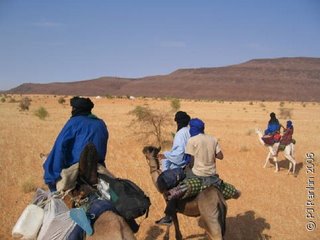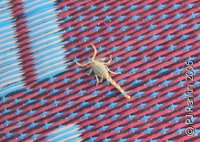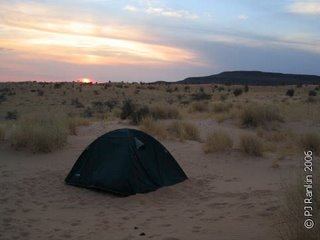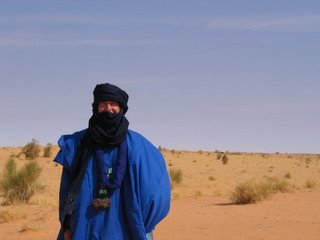Mountains, clean sand and wild winds
 Finally after days on the horizon, the pink mountain we will have to skirt to get to our destination looms large. Our last night on the road before the festival of Essakane, we make camp on white sand dunes not far from the East side of the mountain range.
Finally after days on the horizon, the pink mountain we will have to skirt to get to our destination looms large. Our last night on the road before the festival of Essakane, we make camp on white sand dunes not far from the East side of the mountain range. Tuaregs are very fussy about the right spot to pitch camp: near some acacia tree shade, making use of any wind break against the prevailing northerlies and on pure clean sand, not too close to vegetation. Vegetation means occasional scorpions which have a nasty sting and can crawl into boots at night. It's a bit disturbing getting up to find you've just been sitting on an unhappy rather flattened transparent critter.
Tuaregs are very fussy about the right spot to pitch camp: near some acacia tree shade, making use of any wind break against the prevailing northerlies and on pure clean sand, not too close to vegetation. Vegetation means occasional scorpions which have a nasty sting and can crawl into boots at night. It's a bit disturbing getting up to find you've just been sitting on an unhappy rather flattened transparent critter.But the real bane of Tuareg life near some vegetation is 'cram-crams'. These supremely-adapted burrs hitch on to any rare visitors that pass in the desert with their vicious tiny barbs that cling to everything - not just clothes but flesh as well. They take ages to remove as they stick in your fingers too and often leave fine prickly spines under the skin like from a cactus. Some Tuaregs carry handy ornate silver tweezers on a string around their neck.
A last night for our little band to savour the silence and the friendship that's developed. A last sunset by ourselves. No one says, but there's a sadness in the air and we're not looking forward to the people and noise we'll face on the morrow. Really I'd prefer to keep on going westward to Mauritania.
 That night is full of wild wind djinnis. Suddenly the wind picks up and howls, buffeting the little round tent. I crawl out into a strange landscape white under a fat moon with acacia trees bending in the fierce invisible blast and sand starting to lift into the air. There's a big heap of the others sheltering behind a bush, blissfully slumbering on top of each other under a big woollen blanket. Thorny branches scratch my hands trying to peg the guy lines. Heaping sand all round the canvas edges, I crawl back into the tent fearing the bending and thrashing tent poles will break.
That night is full of wild wind djinnis. Suddenly the wind picks up and howls, buffeting the little round tent. I crawl out into a strange landscape white under a fat moon with acacia trees bending in the fierce invisible blast and sand starting to lift into the air. There's a big heap of the others sheltering behind a bush, blissfully slumbering on top of each other under a big woollen blanket. Thorny branches scratch my hands trying to peg the guy lines. Heaping sand all round the canvas edges, I crawl back into the tent fearing the bending and thrashing tent poles will break.In the morning the wind has gone as suddenly as it arrived. The dunes have presumably crept a few centimetres further and the sand is trackless and pristine again - the wind has erased our history. Quite unconcerned by the wild night, the guides say, 'Yes the wind is always strong near the mountain'. Is this some effect of physics, the range channelling the wind or the lack of any trees close to the mountain to act as a break, or do the djinnis live there?



0 Comments:
Post a Comment
<< Home